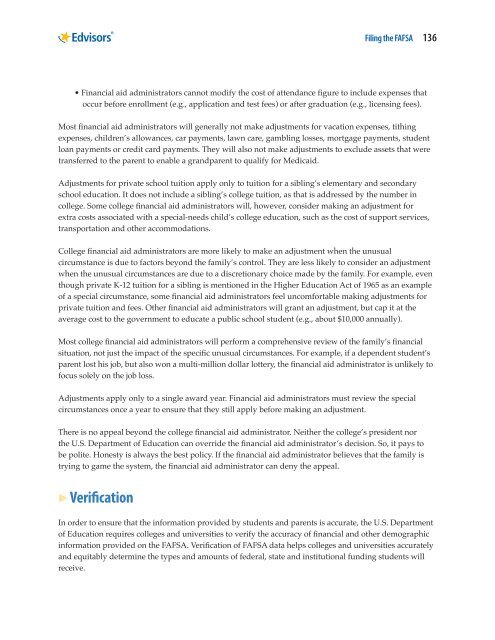filing-the-fafsa-2015-2016-edition
filing-the-fafsa-2015-2016-edition
filing-the-fafsa-2015-2016-edition
You also want an ePaper? Increase the reach of your titles
YUMPU automatically turns print PDFs into web optimized ePapers that Google loves.
Filing <strong>the</strong> FAFSA 136<br />
• Financial aid administrators cannot modify <strong>the</strong> cost of attendance figure to include expenses that<br />
occur before enrollment (e.g., application and test fees) or after graduation (e.g., licensing fees).<br />
Most financial aid administrators will generally not make adjustments for vacation expenses, tithing<br />
expenses, children’s allowances, car payments, lawn care, gambling losses, mortgage payments, student<br />
loan payments or credit card payments. They will also not make adjustments to exclude assets that were<br />
transferred to <strong>the</strong> parent to enable a grandparent to qualify for Medicaid.<br />
Adjustments for private school tuition apply only to tuition for a sibling’s elementary and secondary<br />
school education. It does not include a sibling’s college tuition, as that is addressed by <strong>the</strong> number in<br />
college. Some college financial aid administrators will, however, consider making an adjustment for<br />
extra costs associated with a special-needs child’s college education, such as <strong>the</strong> cost of support services,<br />
transportation and o<strong>the</strong>r accommodations.<br />
College financial aid administrators are more likely to make an adjustment when <strong>the</strong> unusual<br />
circumstance is due to factors beyond <strong>the</strong> family’s control. They are less likely to consider an adjustment<br />
when <strong>the</strong> unusual circumstances are due to a discretionary choice made by <strong>the</strong> family. For example, even<br />
though private K-12 tuition for a sibling is mentioned in <strong>the</strong> Higher Education Act of 1965 as an example<br />
of a special circumstance, some financial aid administrators feel uncomfortable making adjustments for<br />
private tuition and fees. O<strong>the</strong>r financial aid administrators will grant an adjustment, but cap it at <strong>the</strong><br />
average cost to <strong>the</strong> government to educate a public school student (e.g., about $10,000 annually).<br />
Most college financial aid administrators will perform a comprehensive review of <strong>the</strong> family’s financial<br />
situation, not just <strong>the</strong> impact of <strong>the</strong> specific unusual circumstances. For example, if a dependent student’s<br />
parent lost his job, but also won a multi-million dollar lottery, <strong>the</strong> financial aid administrator is unlikely to<br />
focus solely on <strong>the</strong> job loss.<br />
Adjustments apply only to a single award year. Financial aid administrators must review <strong>the</strong> special<br />
circumstances once a year to ensure that <strong>the</strong>y still apply before making an adjustment.<br />
There is no appeal beyond <strong>the</strong> college financial aid administrator. Nei<strong>the</strong>r <strong>the</strong> college’s president nor<br />
<strong>the</strong> U.S. Department of Education can override <strong>the</strong> financial aid administrator’s decision. So, it pays to<br />
be polite. Honesty is always <strong>the</strong> best policy. If <strong>the</strong> financial aid administrator believes that <strong>the</strong> family is<br />
trying to game <strong>the</strong> system, <strong>the</strong> financial aid administrator can deny <strong>the</strong> appeal.<br />
▶ Verification<br />
In order to ensure that <strong>the</strong> information provided by students and parents is accurate, <strong>the</strong> U.S. Department<br />
of Education requires colleges and universities to verify <strong>the</strong> accuracy of financial and o<strong>the</strong>r demographic<br />
information provided on <strong>the</strong> FAFSA. Verification of FAFSA data helps colleges and universities accurately<br />
and equitably determine <strong>the</strong> types and amounts of federal, state and institutional funding students will<br />
receive.


